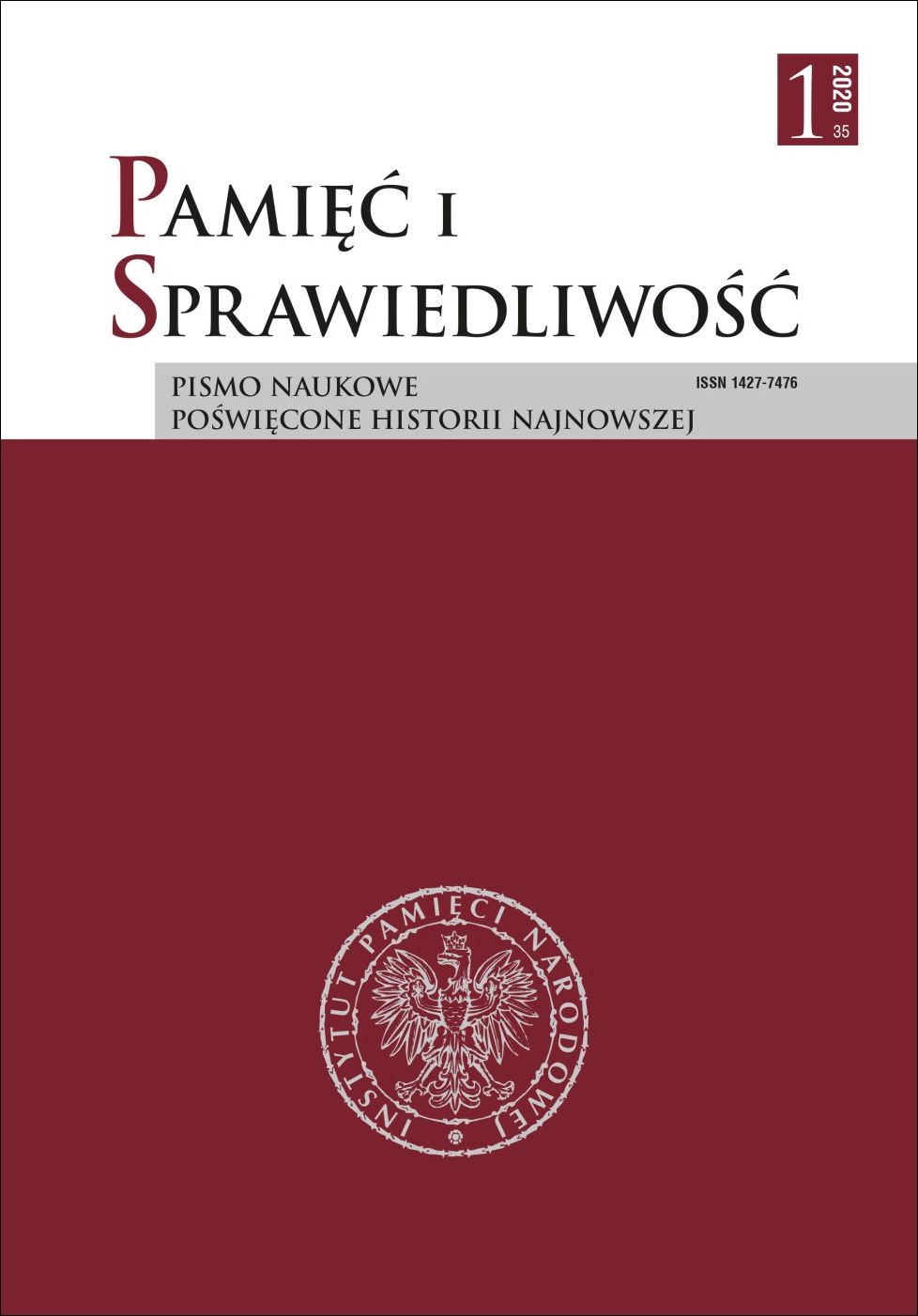K 231. Association of Former Political Prisoners in Czechoslovakia during the Prague Spring of 1968
Pamięć i Sprawiedliwość, Tom 35 Nr 1 (2020), strony: 114-140
Data publikacji: 2020-06-30
 https://doi.org/10.48261/pis203506
https://doi.org/10.48261/pis203506
Abstrakt
The Prague Spring of 1968 represents the most extensive attempt at reform Communism. Delayed destalinisation brought various changes, and socialism was to be given a “human face.” At the end of March 1968, K 231 was established, associating political prisoners convicted under Section 231 for “subverting the republic,” and over three thousand of them from all over Czechoslovakia gathered in Žofín, Prague. They were called “former people” or “hostile persons” by the ruling Communist regime. Political prisoners stated that they did not want to be a political party. They actively built their organisation – they established local, district, regional and provincial branches. They were headquartered on Karlovo náměstí (Charles Square) in Prague, eight commissions were active, and their mission was to achieve legal, civic and social rehabilitation. Around 80,000 members subscribed to the “reform process,” demanded the removal of all discriminatory measures and emphasised that they were not seeking revenge, but justice. Political prisoners from Slovakia became involved in the establishment of K 231, but soon decided to go their own way and set up their own organisation. The Slovak Organisation for the Defending of Human Rights, a sister organisation of K 231, was founded on 7 April 1968 in Bratislava. Although former Czech and Slovak political prisoners acted amicably, they became as undesirable for Dubček’s reform Communists as the Klub angažovaných nestraníků (Club of Involved Independents) or the preparatory committee of the Social Democratic Party. Throughout the Prague Spring, they tried to legalise their activities, but in vain. Instead, they remained under observation by the secret police, and under pressure from Moscow, hostility and media attacks against them escalated. With the occupation of 21 August 1968, when all hopes were shattered, their five-month tenure ended. On 5 September 1968, the Ministry of the Interior refused to register K 231, and the association ceased all operations. Numerous representatives went into exile; those who remained in their homeland became “people of interest” to the State Security, were monitored, called for questioning, and their “counter-revolutionary efforts” were denigrated. In fact, their work showed the possibilities and limits of the Prague Spring. Former political prisoners were still strong enough and their association had great potential, not only moral, but also intellectual and educational. Strong personalities, strong stories – the first organisation of political prisoners in Czechoslovakia.
Bibliografia
Act on Judicial Rehabilitation No. 82/1968 Coll. was adopted by 218 votes from 219, with one abstention. Národní shromáždění republiky Československé 1964–1968 [online]. Library of PSP ČR, Praha [2000] [accessed 12 July 2019]. Chamber of Deputies, stenographic minutes of the 24th sitting, Tuesday, June 25, 1968. Available from http://www.psp.cz
Goldstücker E., Vzpomínky 1945–1968, Praha 2005.
Government proposal amending and supplementing the Act on Judicial Rehabilitation No. 82/1968 Coll. was adopted by 173 votes in favour, no one against and no abstentions. Federální shromáždění Československé socialistické republiky 1969–1971 [online]. Library of PSP ČR, Praha [2000]. Chamber of the People, stenographic minutes of the 9th sitting, Wednesday, 8 July 1970. Available at http://www.psp.cz.
Rokoský J., Mons. Antonín Bradna—O katolické církvi, komunistickém kriminálu a přátelství, [in:] Hovory o Československu (DVD). FF UJEP, Ústí nad Labem 2005.
Rokoský J., Radiomechanik František Zahrádka – Jak se převádělo přes hranice, o životě v komunistických lágrech, fárání v uranových dolech, [in:] Hovory o Československu (DVD). FF UJEP, Ústí nad Labem 2006.
Rokoský J., Řemeslník Ota Rambousek – O pankrácké věznici, agentech chodcích a čistém štítě v komunistických kriminálech, [in:] Hovory o Československu (DVD). FF UJEP, Ústí nad Labem 2007.
Blažek P., Bursík T., Halla J., Hoppe J., Aby se to už neopakovalo. Katalog k výstavě o dějinách sdružení bývalých politických vězňů K 231, Praha 2008.
Brodský J., Řešení Gama, Ústí nad Labem 2007.
Bursík T., Klub 231, ministerstvo vnitra a jeho analytický odbor v roce 1968, [in:] Bezpečnostní aparát, propaganda a Pražské jaro, Praha 2009.
Gaďourek I., Nehněvajsa J., Žalářovaní, pronásledovaní a zneuznaní, Brno 1997.
Halla J., Organizace bývalých politických vězňů: Klub K 231 v exilu (1985–1990), Master Thesis, Historický ústav FF MU, Brno 2001.
Havel V., Spisy III. Eseje a jiné texty z let 1953–1969, Praha 1999.
Hoppe J., Opozice ‘68. Sociální demokracie, KAN a K 231 v období pražského jara, Praha 2009.
Kaplan K., Mocní a bezmocní, Toronto 1989.
Mayer F., Češi a jejich komunismus. Pamět’ a politická identita, Praha 2009.
Pithart P., Osmašedesátý, Praha 1990.
Rambousek O., Gruber L., Zpráva dokumentační komise K 231, Belgium 1973.
Rambousek O., “Vznik K 231”. Západ, issue 1., vol. 7, 1985.
Šmídová L., Tři životy. František Falerski – skaut, politický vězeň a osobnost K 231, Praha 2018.
Tajovský B.V., Člověk musí hořeti, Praha 2009.
Veverková E., Znovu bych mu ruku podala!, Středokluky 2004.
Vondrová J., Navrátil J. (eds.), Mezinárodní souvislosti československé krize 1967–1970, 4th part, 2nd volume, doc. no. 169.
Licencja

Utwór dostępny jest na licencji Creative Commons Uznanie autorstwa – Użycie niekomercyjne – Bez utworów zależnych 4.0 Międzynarodowe.
 Język Polski
Język Polski
 English
English
 Deutsch
Deutsch
 Français (France)
Français (France)
 Italiano
Italiano
 Русский
Русский


 PDF (English)
PDF (English)




